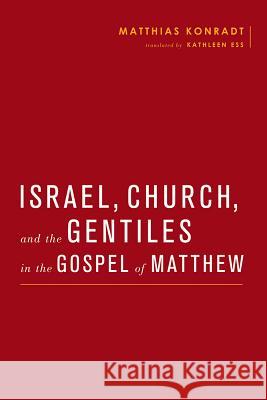Israel, Church, and the Gentiles in the Gospel of Matthew » książka
Israel, Church, and the Gentiles in the Gospel of Matthew
ISBN-13: 9781481301893 / Angielski / Twarda / 2014 / 500 str.
Israel, Church, and the Gentiles in the Gospel of Matthew
ISBN-13: 9781481301893 / Angielski / Twarda / 2014 / 500 str.
(netto: 348,41 VAT: 5%)
Najniższa cena z 30 dni: 362,09
ok. 30 dni roboczych.
Darmowa dostawa!
"Israel, Church, and the Gentiles in the Gospel of Matthew" addresses one of the central theological problems of Matthew's Gospel: what are the relationships between Israel and the Church and between the mission to Israel and the mission to the Gentiles? To answer these questions, Matthias Konradt traces the surprising transition from the Israel-centered words and deeds of Jesus (and his disciples) before Easter to the universal mission of Jesus' earliest followers after his resurrection.
Through careful historical and narrative analysis, Konradt rejects the interpretation of the Gospel of Matthew that the Church replaced Israel in God's purposes--that is, the interpretation that because Israel rejected Jesus as Israel's Messiah, the Church replaced Israel in the role of God's chosen people. Konradt instead discovers in Matthew that the Israel- and universally-centered dimensions of God's saving purposes are far more positively connected. Matthew develops a narrative that features Jesus' identity as both the messianic Son of David "and" the universal Son of God. What developed into a mainly Gentile Church should never think of itself as the "new" or "true" Israel; rather, according to Matthew's Gospel, the Church represents an extension of the promises first made to Israel and now inclusive of the Gentiles.











